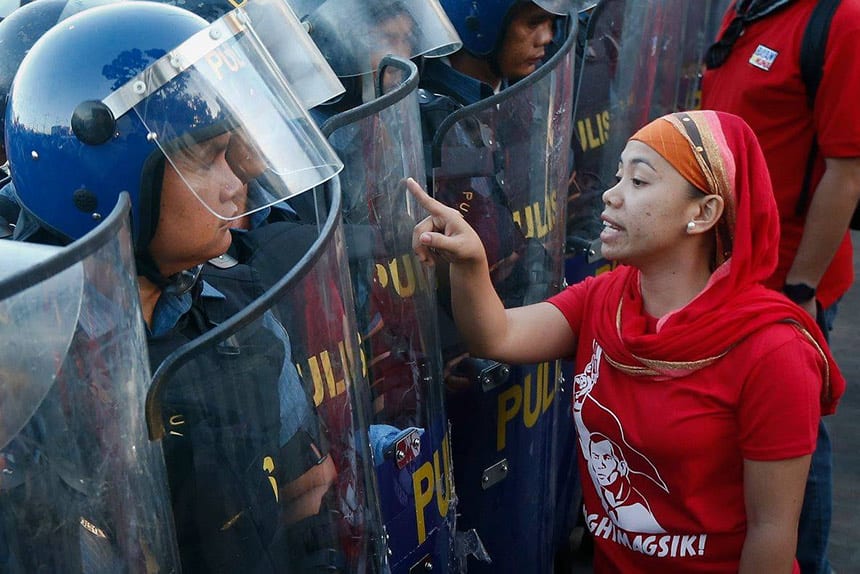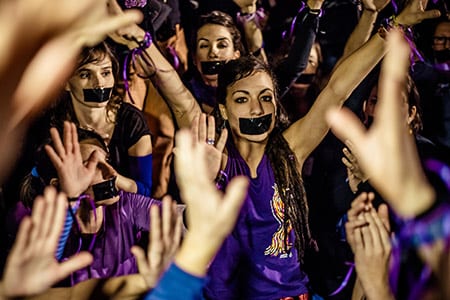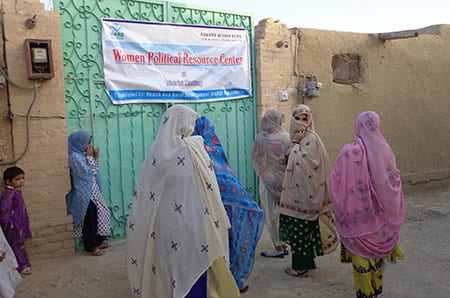
By Kirsten Mickelwait
“Closing space.” It may be a term that’s not yet widely recognized, but within the realm of human rights activists working for women’s rights and gender issues, it’s all too familiar. Closing space refers to the ways in which repressive governments are restricting the work of activists worldwide, including women and LBGTQI+ human rights defenders (collectively known as WHRDs).
Methods often employ legal or political restrictions to choke dissenters under the radar. Unlike physical violence, bureaucratic regulation grabs fewer headlines and is harder to identify – yet it’s no less destructive to the vitality of participatory democracy and civil disobedience. And because WHRDs work on behalf of the world’s most marginalized communities, they are themselves especially vulnerable to these threats.
Such was the motivation behind a new report released on Human Rights Day, December 10, 2017. Rights Eroded: A Briefing on the Effects of Closing Space on Women Human Rights Defenders was developed through a partnership of Berkeley Law’s International Human Rights Law Clinic (IHRLC) and the Oakland-based Urgent Action Fund for Women’s Human Rights (UAF). Between the two organizations, eighteen women contributed to the publication.
Human rights on the ropes
The collaboration was prompted when Laurel Fletcher – a Berkeley Law clinical professor and the director of the IHRLC – met UAF Executive Director Kate Kroeger at a conference. The two shared a deepening concern about the rise of authoritative regimes around the world and their impact on female human rights activism.

“We often read about individual human rights struggles, but we wanted to pan back and show the emerging pattern in a larger context,” says Fletcher, who’s also the co-faculty director of the Miller Institute for Global Challenges and the Law. “Russia is trying to export its repressive laws throughout the region, for example, and other large countries like China and India are imposing new restrictions. It’s a global crisis and we need to shine a spotlight on this. The environment for human rights is on a downward trend – human rights activists are on the ropes.”
The 47-page report explains international human rights norms regarding closing space, as well as the domestic legal frameworks in such problematic areas as Russia, Africa, Asia, Latin America, and the Middle East. Its findings were compiled from extensive interviews with workers from 16 countries conducted in person, as well as via Skype and phone calls. Experiences were related from across the globe, from persecution of feminist activists in Nicaragua to ongoing acceptance of sexual violence in India to the systematic use of brutal violence and institutional barriers against gender activists and sex workers in Russia.
Among the report’s basic conclusions are that WHRDs are particularly impacted because they operate in a hostile social and political environment that compounds the effects of closing space, and that self-censorship is the most common, tangible consequence for these activists. The report makes a series of recommendations for states, donors, and the United Nations that would strengthen protections for these human rights activists and their organizations.
A legal lens
This was the first time that the Urgent Action Fund had worked with an academic institution, says UAF Director of Programs Shalini Eddens. With the participation of the international law clinic, the report offers a legal lens that adds teeth and deepens the conversation around the gendered aspect of closing space, she says, which may lead to greater impact and broader solutions.

“For more than 20 years, we’ve helped to support resilient feminist movements around the world,” she says. “Our rapid-response grant-making program offers WHRDs immediate funding when opportunities or dangers suddenly arise. But repressive incidents of closing space are becoming more blatant and outright, and the risks are becoming higher. Our goal is to hold these countries more accountable, and we’re hoping that our work with the clinic will accelerate that process.”
UAF was formed in response to human rights abuses during the Third Balkan War. Since then, other activism has grown around women’s rights, sex workers, youth, and LGBTQI+ issues. The organization issues about 120 grants per year to organizations in the Middle East, Asia, Central Asia, Turkey, and North America. Three sister funds operate in Africa, Latin America, and the Asia Pacific region. Recent grants have provided funding for higher security at a sexual health and rights organization; evacuation and rehabilitation for a journalist who had been beaten after covering stories about transgender experiences; and relocation expenses for a human rights worker who was being threatened with arrest.
Just as impactful as these repressive measures is the element of self-censorship, Fletcher says. “Bureaucratic violence diminishes the capacity for WHRDs to flourish, and self-censorship is the invisible drip-drip-drip that drains the civic space of important voices,” she says. “Fear, financial repercussions, or obstacles to registration prevent them from demanding their rights in a full-throated way.”
A worldwide phenomenon
Katrina Natale, clinical teaching fellow with the IHRLC, supervised the work of six student interns, each of whom dug into the domestic laws of several countries. “Through interviews and in-depth legal research, they unearthed and documented a broad scope of restrictions – from limitations on funding sources to obstacles in registering as NGOs to accusing them of terrorist activities,” she says.
“The problem is not only about administrative barriers, but also about stigmatizing and criminalizing the kinds of work they’re involved in.” There’s a great deal of hostility toward not just these WHRDs, but also their families, she says, who are often accused of crimes against national security. Penalties are high – including the death penalty.
The research and interaction with WHRDs was a game-changing experience for the students. “I was surprised to learn that these coercive state practices are not solely confined to typically oppressive regimes,” says Jenna Alia ’17. “We tend to think that such issues are limited to a handful of countries, but we’re really seeing a crackdown around the world.”
Sarah Mirza ’18 agrees. “While the report shows how the closing of space specifically impacts WHRDs, the harm being done by these restrictive laws is far-reaching and felt in all corners of society,” she says.
And Sarah Hunter ’18 notes that the experience has helped to solidify her desire to pursue a career in human rights. “The chance to push for greater protection of these activists has been a special privilege. I see this report as a kind of metaphorical megaphone that will hopefully make their voices, and their fights, heard at a higher level,” Hunter says.